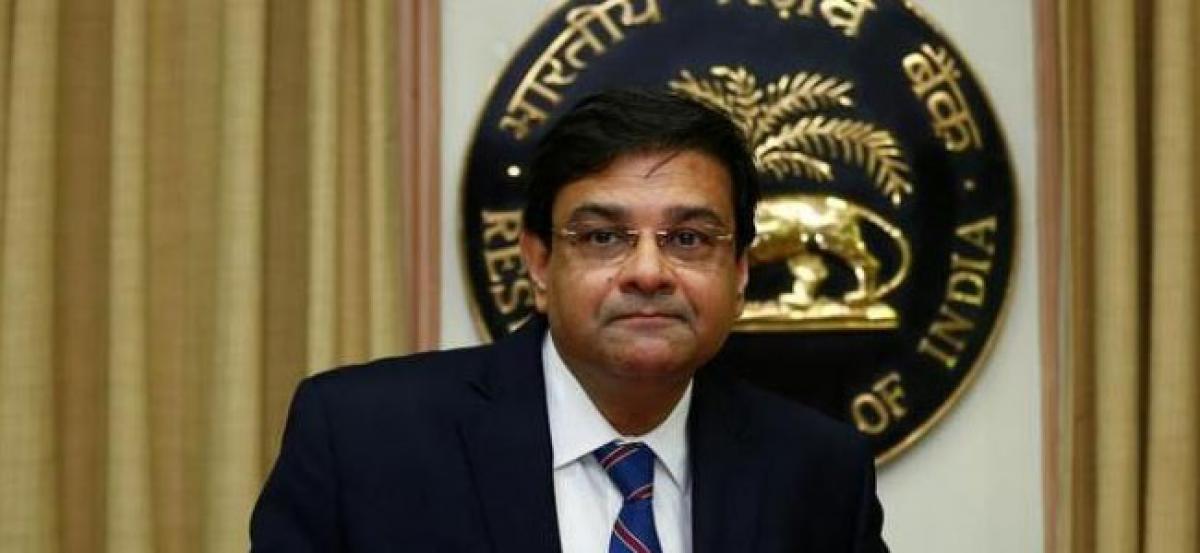Live
- First Impressions and Unboxing of the MacBook Pro M4: A Powerhouse for Professionals and Creators
- China Gears Up for Potential Trade War Amid Trump’s Tariff Threats
- Small Farmers Gain Less by Selling to Supermarkets: Study Reveals
- Why Despite the Controversy, America Is Anticipating the Mike Tyson vs. Jake Paul Fight
- Sanju Samson and Tilak Varma Shine: Record-Breaking Feats in 4th T20I Against South Africa
- India Urges $1.3 Trillion Annual Climate Support for Developing Nations
- Bad air: 106 shuttle buses, 60 extra Metro trips planned to make Delhiites give up cars
- WHO reports declining monkeypox cases in Congo
- CM Attends Kotideepotsavam on Kartika Purnima
- PKL Season 11: Raiding trio of Devank, Ayan, Sandeep help Patna Pirates rout Bengal Warriorz
Just In

The Reserve Bank of India (RBI) unexpectedly kept its key policy rate unchanged at 6.25 percent on Wednesday, despite calls for action in the face of an intense cash shortage that threatens to slam the brakes on the world\'s fastest-growing large economy.
MUMBAI: The Reserve Bank of India (RBI) unexpectedly kept its key policy rate unchanged at 6.25 percent on Wednesday, despite calls for action in the face of an intense cash shortage that threatens to slam the brakes on the world's fastest-growing large economy.
The RBI's monetary policy committee voted 6-0 to leave the repo rate unchanged, saying it needed more time to assess if the recent cash squeeze would cause more lasting damage to the economy.
Pressure on the central bank and its governor, Urjit Patel, to act has grown since Prime Minister Narendra Modi stunned the country on Nov. 8 by abolishing 500- and 1,000-rupee notes ($7.35-$14.70), removing 86 percent of the currency in circulation in a bid to crack down on the "shadow economy".
While shortages of new bank notes are still being reported, and some companies' cash-reliant supply chains have been left in tatters, the government insists conditions will steadily improve by the end of the year.
The RBI also said it expected the impact from the measures to ebb as new notes come into circulation, even as it trimmed its growth forecast for the year ending in March 2017.
"It is important to analyse more information and experience before judging their full effects and their persistence," the RBI said in a statement.
"If the impact is transient as widely expected, growth should rebound strongly."
A majority of 56 analysts polled by Reuters had expected a rate cut of at least 25 bps, after a similar move at the RBI's last review in October.
But 18 analysts had forecast policy would remain unchanged.
As expected, the central bank did withdraw the temporary 100 percent increase in the cash reserve ratio announced late last month that was intended to absorb the extra liquidity from people depositing the abolished notes into their banks.
That surge in liquidity has raised hopes banks will now be able to lower lending rates, and hence borrowing costs across the economy.
POLICY UNCERTAINTY
In keeping its policy setting steady, the central bank also expressed concerned about the risk of a flare-up in inflation.
Although consumer inflation eased in October to 4.20 percent, below the RBI's target of 5 percent by March, prices in India have traditionally been dependant on volatile food and fuel prices. Global crude oil prices have spiked in the last week.
The RBI expressed special concern about core inflation, which remained around 5 percent in October. Patel, in a news briefing, called it of "critical importance" to monetary policy.
The RBI also cited concerns about the "high volatility" in global financial markets, and the potential spillover as the U.S. Federal Reserve gears up to raise interest rates next week.
The RBI's views on the economy, like the government's, are more optimistic than many private forecasters and at odds with bond markets, which had sent the 10-year bond yield to a 7-1/2 year low last month on anticipation of aggressive rate cuts, but up 20 bps on Wednesday.
India's economy grew by an annual 7.3 percent between July and September, the fastest for any large economy. Data from last month was discouraging, showing auto sales plunged and service-sector activity contracted.
The differing views add uncertainty about the RBI's next policy review in February, sparking a debate about whether it displayed a welcome dose of independent thinking and reassurance about the economy - or whether it risked being too optimistic.
The monetary policy committee was constituted this year to make decision-making more transparent and less dependant on the RBI governor. It is composed of six members, three from the RBI including Patel and three nominated from a government panel.
"The RBI seems to be a little inconsistent in the different things it is trying to say," said Varun Khandelwal, managing director of Bullero Capital.
"It is difficult to say at this point whether there will be a rate cut in the next policy meet."

© 2024 Hyderabad Media House Limited/The Hans India. All rights reserved. Powered by hocalwire.com







